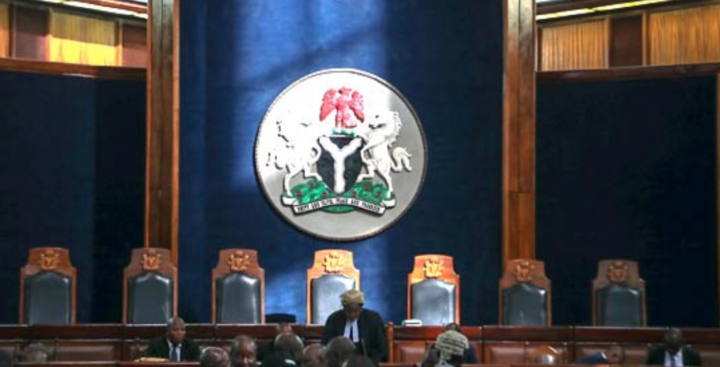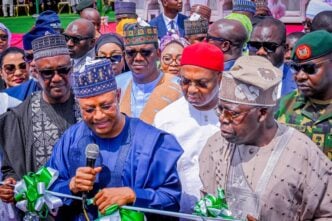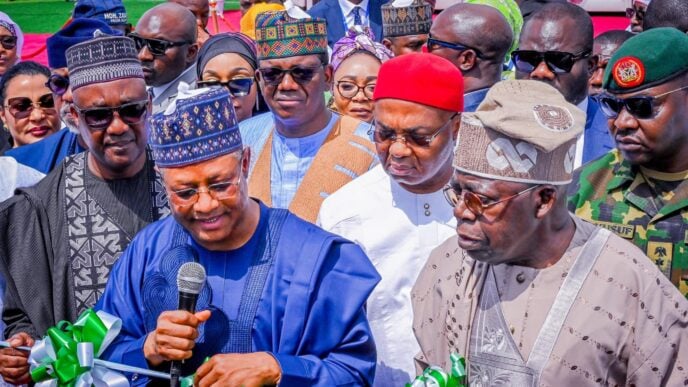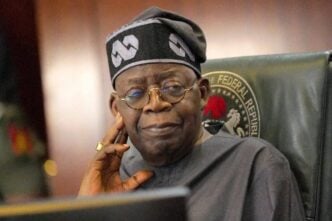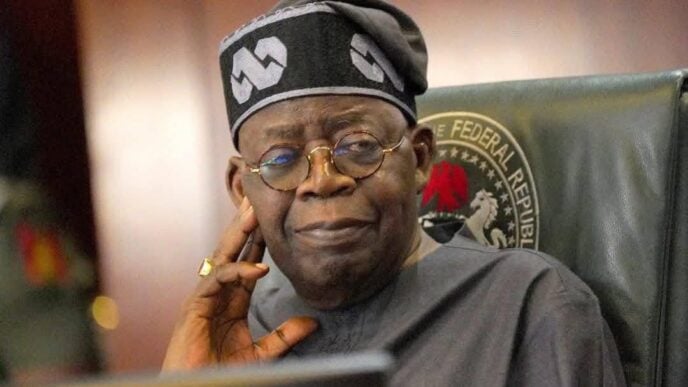A banner from the 'Nigeria Must Go' protest in Ghana
BY ALABA ABDULRAZAK
There is an unsettling symmetry in the recent Ghanaian protests, demanding the expulsion of Nigerians from their country—an echo that reverberates from the bitter memory of 1983, when over a million Ghanaians were unceremoniously expelled from Nigeria in the notorious “Ghana Must Go” saga.
That traumatic episode, once authored by Nigeria, now returns in reverse, with Nigeria suffering the indignities of resentment and rejection across Africa and beyond.
This poignant irony transcends the realm of migration or mere social discord; it stands as a sobering censure of Nigeria’s protracted leadership debacle.
Advertisement
Let us revisit history. At independence in 1960, the world regarded Nigeria with optimism. Alongside nations like China, India, and Brazil, Nigeria was counted among those destined to ascend into the league of global powerhouses.
Endowed with prodigious natural resources and a dynamic populace, Nigeria once appeared set on an inexorable path to greatness.
Tragically, over six decades hence, Nigeria endures as an underdeveloped titan—abundant in resources, yet sorely deficient in harnessing human capital and bereft of visionary leadership.
Advertisement
At the core of Nigeria’s malaise lies the human factor. The determinant of a nation’s ascendancy is not the volume of oil, cocoa, palm produce, or minerals, but rather the calibre of its leadership and its capacity to galvanise the potential of its citizenry.
Whereas countries such as China and India have emphasised strategic human development, institution-building, and progressive governance, Nigeria’s governing elite have been relentlessly plagued by corruption, mismanagement, and a glaring disregard for the welfare of ordinary citizens.
This entrenched culture of elite impunity has rendered Nigeria’s immense resources a tragic irony: a country where healthcare collapses, education stagnates, and infrastructure deteriorates, while an entitled minority indulge in opulence. Governmental inaction and neglect have compelled innumerable Nigerians to seek livelihoods abroad, fostering a diaspora often met with hostility and disdain.
The recent protests in Ghana, rife with allegations of criminality and moral decay attributed to Nigerians, are symptomatic of these wider systemic failures.
Advertisement
Let us not forget that the enduring image of the “Ghana Must Go” bag—a sturdy, checkered sack now emblematic of forced exile—still lingers in collective memory, serving as a poignant reminder of deep-seated regional divisions yet to be resolved.
Today, as Ghanaians protest with placards denouncing perceived kidnappings, prostitution, and ritual crimes linked to Nigerians, it is evident that the social fabric is dangerously tattered.
This predicament constitutes a profound lesson in the power of leadership to shape national destiny. Nigerian leadership has failed, not merely in fostering economic transformation but in safeguarding regional unity and respect.
Once a lodestar of African promise, Nigeria has slipped into ignominy, encapsulating squandered potential and dashed aspirations.
Advertisement
The core pathology is a leadership class that has consistently prioritised personal enrichment over national advancement. Until Nigerian leaders embrace accountability, invest in human capital, and confront endemic corruption, the nation’s reputation and internal harmony will deteriorate ever further.
The tragic cycle of mutual suspicion and ostracism between Nigerians and Ghanaians—and, by extension, among African states—can only be shattered by principled governance, empathy, and a sincere dedication to the collective good.
Advertisement
Nigeria’s boundless endowments are futile absent the resolve and political will to translate them into genuine development.
Ultimately, the real “must go” edict is reserved for the corrosive leadership malpractices that have transmogrified Africa’s wealthiest nation into a global cautionary tale.
Advertisement
Nigeria’s renaissance is contingent upon an urgent, concerted effort to elevate its leadership from the morass of venality and apathy, so it may at last fulfil the promise long expected of the “Giant of Africa.”
Advertisement
Views expressed by contributors are strictly personal and not of TheCable.



